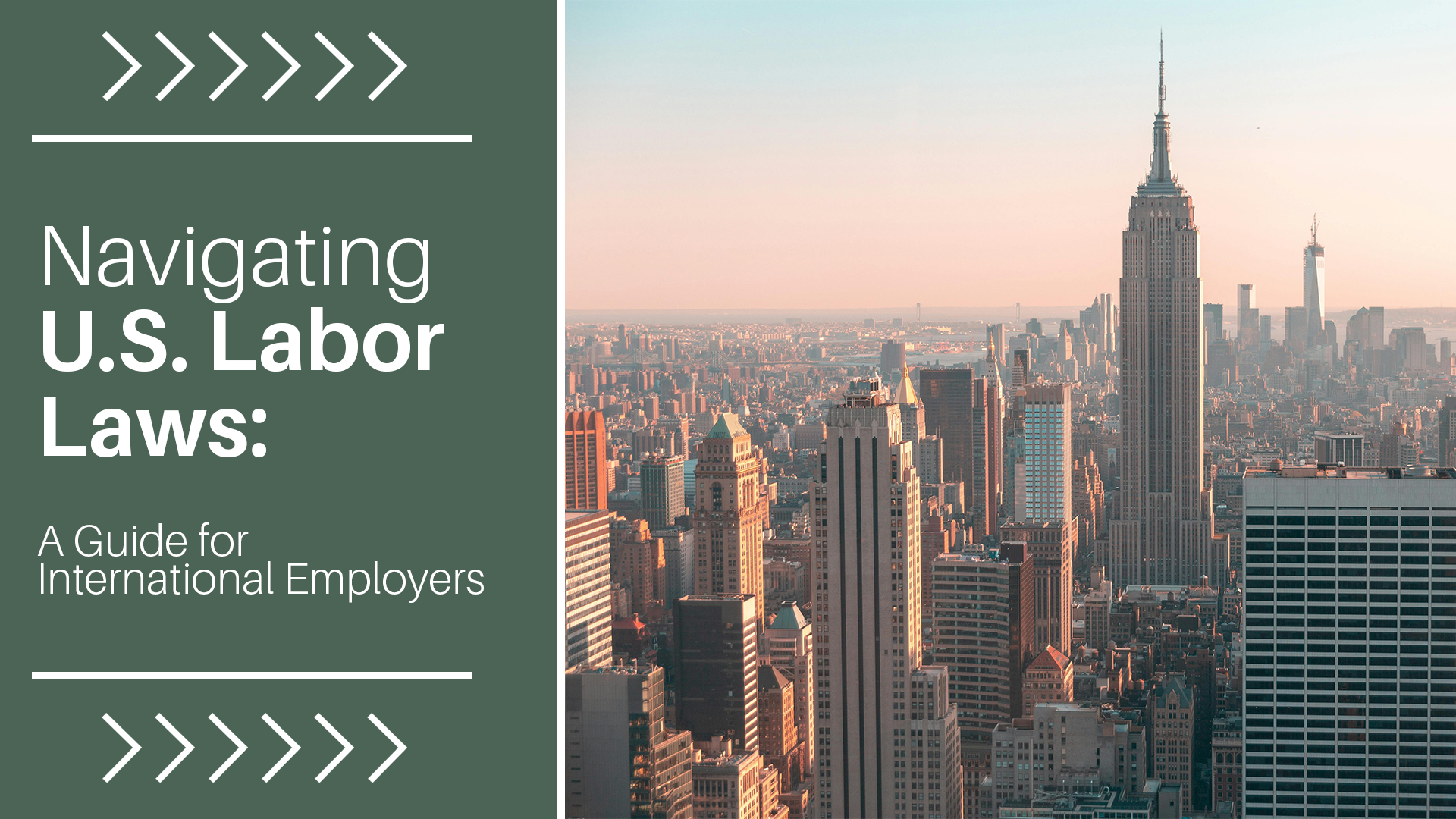Navigating U.S. Labor Laws: A Guide for International Employers
Navigating U.S. Labor Laws: A Guide for International Employers

For European companies exploring expansion into the U.S. market, understanding and complying with U.S. labor laws is a critical step. While the opportunities are vast, the legal landscape in the U.S. can be challenging to navigate for international employers. For companies accustomed to different legal systems, such as those in Europe, it’s essential to grasp the nuances of U.S. regulations to ensure compliance, avoid costly penalties, and maintain smooth operations.
This guide will walk you through critical areas where U.S. laws differ from international standards and offer insight into navigating these complexities effectively.
Understanding the Differences Between U.S. and International Labor Laws
U.S. labor laws differ in several key ways from those in other countries, particularly in Europe. These differences may not be immediately obvious but can have major implications for your business operations.
- At-Will Employment: Imagine a company from the UK expanding into the U.S. and encountering the at-will employment system. In the UK, employment contracts typically provide significant job security, with employers required to demonstrate just cause for termination. However, in the U.S., employers can dismiss employees at will, as long as it isn’t for discriminatory reasons. This difference might surprise a UK-based company, which may need to adjust their approach to termination policies to align with U.S. practices, where terminations can happen more abruptly.
- Federal vs. State Laws: U.S. labor laws operate under a complex web of federal and state-specific rules. For example, California has some of the most stringent labor laws, including overtime and break requirements that exceed federal law. A European-based company expanding into multiple U.S. states without understanding the differences might assume federal laws apply universally, only to find itself in violation of certain state regulations. Companies can easily avoid legal troubles by partnering with experts who understand both federal and state laws. (Contact us to get started today!)
- Healthcare: The U.S. also places a significant burden on employers to provide health insurance, a practice uncommon in countries with universal healthcare. For instance, if a German company isn’t aware of U.S. obligations, it could fail to offer appropriate health coverage, triggering penalties under U.S. law. We’ll explore this further in the next section.

Insurance and Employee Benefits: What You Need to Know
One of the biggest challenges for international companies is navigating U.S. insurance and employee benefit requirements. Under the Affordable Care Act (ACA), companies of a certain size are required to provide health insurance to their employees. Failure to do so can result in hefty penalties.
Consider a hypothetical French tech startup that expands into the U.S. without realizing that it must provide healthcare to full-time employees. In France, the state covers healthcare, so this isn’t something they typically handle. If they don’t comply with U.S. standards, they could face penalties—and that’s just for healthcare.
Navigating the Affordable Care Act (ACA)
Under the ACA, employers with 50 or more full-time employees are required to provide affordable health insurance that meets specific coverage requirements. Failing to comply can result in significant penalties, which are based on how many employees aren’t provided adequate insurance.
Let’s imagine a UK-based company with 60 employees expanding into the U.S. Without understanding that their U.S. employees need healthcare coverage, they only offer minimal plans. This leads to penalties, but had they partnered with an experienced HR consultant, they could have avoided these costs altogether by offering ACA-compliant health plans.

Employee Contracts and Compliance
In Europe, employment contracts are standard and offer a high degree of job security. In the U.S., however, most employees work under "at-will" employment, meaning either the employer or employee can terminate the working relationship at any time, with limited exceptions. For European companies expanding into the U.S., this difference can lead to challenges in reconciling their typical contractual practices with U.S. norms.
Let’s take a hypothetical example: A German company enters the U.S. market and, following their usual practice, provides employment contracts that outline specific termination conditions. While this may be unnecessary under U.S. law, it can provide additional clarity and protection for both the employer and employees. However, if the company relies too heavily on their European practices without considering U.S. laws, they may not take full advantage of the flexibility that at-will employment offers.
Do You Need a Written Employment Contract?
While written contracts are not required for most U.S. employment situations, European companies typically use them to define roles and expectations. These contracts can still be beneficial in the U.S., particularly for high-level positions where job security and specific benefits need to be detailed.
For instance, if an Italian company hires a U.S.-based executive, providing a detailed employment contract can help establish clear terms regarding bonuses, severance, and job duties. This ensures both parties are aligned, even in the context of the at-will system, which allows for terminations without cause in many other situations.
Stay Compliant with International Labor Standards Using The Human Resource USA
Navigating the intricacies of U.S. labor laws while maintaining compliance with international standards can be complex. Fortunately, The Human Resource USA is here to help. With extensive experience in labor law compliance, conflict resolution, and proactive HR management, we guide businesses through the complexities of both U.S. and international labor laws.
Whether it’s understanding the nuances of employee contracts or managing insurance requirements under the ACA, The Human Resource USA ensures that your company remains compliant, avoids penalties, and stays focused on growth and success.
Contact us today to discuss how we can support your organization!
Stay ahead of the curve in HR practices by following our podcast, ranked among the top 30 globally. Whether you're on your commute or need quick insights, tune in for expert tips and actionable advice.
Happy with the difference The Human Resource USA made for your business? Leave us a quick five-star review.
